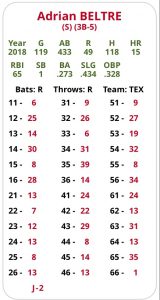Adrian Beltre reminds me that baseball is like Shakespeare’s Seven Ages of Man, and it has a subtle way of making you feel the passage of time.
When you first discover the game, you’re a child and the players seem like stars dropped from the heavens. As you reach school age, the players are your heroes, and you revere them with a child’s innocence. It seems like your heroes will play forever. When you reach your teens, your interests turn to other things and your childhood baseball heroes become distant memories. Your baseball heroes start to retire and your connection to the game weakens. Soon, you’re a young adult who’s concerned with your career and reputation…but you find some time, once again, for baseball. Before you know it, you’ve reached middle age and gained wisdom. You have the resources to enjoy the game in new ways, and you discover a new appreciation and understanding of the depths of baseball. At some point, you notice your childhood heroes are coaches and managers…and you recall thinking when you were a kid, that only gray-haired oldtimers were coaches and managers. Some of your childhood heroes even make it to the Hall of Fame, which you use to think was reserved for players you never saw play. In the blink of an eye, you’re an old person who’s set in his ways. You’re understanding of the game is firm and you’re not swayed by its modern incarnations. You appreciate nostalgia more than modernity. Finally, you reach the end of your life and your second infancy. You depend on others to deliver your baseball needs. The game returns to it’s simplest form for you, and you appreciate it once again at a childlike level.
Baseball players also go through the Seven Ages of Man. You know you’re getting old when you see a player pass through them all. I’ve done so with countless players including Adrian Beltre. It seems like only yesterday that Beltre was a teenage rookie with the Dodgers that I wanted on my fantasy baseball team. My seven stages of a ballplayer are derived from Joe Maddon’s Five Stages of a Ballplayer plus two I’ve added. They are 1. I’m happy to be here. 2. Survival Mode 3. I belong here. I can do this. 4. I want to make as much money as possible. 5. All I want to do is win. 6. I want to decline gracefully. 7. Retirement…and possibly the Hall of Fame.
With a closer look, Adrian Beltre has traveled through all of these stages. When he came up with the Los Angeles Dodgers in 1998, he showed a great deal of promise and produced solid seasons for his first five years. At first, he was happy to be in the Big Leagues, but soon he showed he belonged. Then, in 2004, he reached a new level when he smacked an NL-leading 48 homers while hitting .334 with 121 RBI. It was a perfect time for the best season of his career because it landed him a big free agent contract with the Seattle Mariners. In Seattle’s spacious ballpark, Beltre was solid but disappointing. After 2009, he was once again a free agent. Many thought he was washed up at age 30. Beltre signed a one-year deal with the Boston Red Sox and had a tremendous bounce-back season, hitting .321 with 28 homers and 102 RBI. This allowed him to sign another lucrative contract, this time with the Texas Rangers. In hitter-friendly Texas, Beltre’s career took off. He became a perennial All-Star and Gold Glove-caliber third baseman. Throughout his career, Beltre was blessed with good health, and this enabled him to collect over 3,000 hits and nearly 500 home runs, all while hitting at a very respectable .286 for his career. Age and injuries finally caught up with Beltre, but he was able to decline gracefully. However, in five postseason appearances, he was never able to a World Series Championship.
| Split | G | GS | PA | AB | R | H | 2B | 3B | HR | RBI | SB | BB | SO | BA | OBP | SLG | OPS | GDP | HBP |
|---|---|---|---|---|---|---|---|---|---|---|---|---|---|---|---|---|---|---|---|
| 2018 Totals | 119 | 113 | 481 | 433 | 49 | 118 | 23 | 1 | 15 | 65 | 1 | 34 | 96 | .273 | .328 | .434 | .763 | 13 | 6 |
Adrian Beltre was able to decline gracefully. His final APBA card is a testament to his consistency. Even though he lost his footspeed, he was a productive hitter and an excellent fielder to the end. For a player to be rated a Third baseman (5) in his 21st season is proof that Beltre’s five Gold Gloves were not a fluke. Statistically, Adrian Beltre is the second best fielding third baseman of all time, trailing only Brooks Robinson. This final APBA card is solid and will probably start in many leagues around the country. It’s got a little power and should produce a .267 average, which is close to the .273 mark Beltre put up in 2018. Plus, as any diehard APBA fan knows, this card is a killer with a runner on third only.
In 2024, Adrian Beltre should be a first-ballot Hall of Famer. He is one of the top five third basemen of all-time. Considering he never had a scandal or connection to PEDs, the path seems clear for him. On offensive alone, Beltre would get into the Hall of Fame, especially since he reached 3,000 hits. However, when you also consider his defense, his candidacy is a no-brainer.




